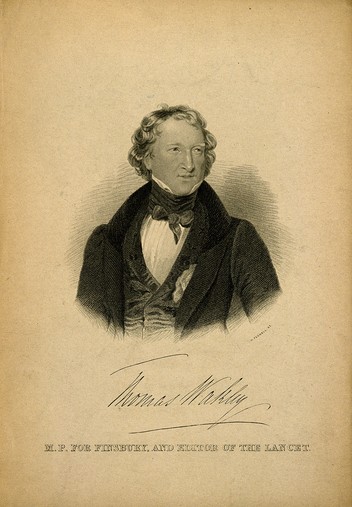Surgeon and founder of The Lancet

Thomas Wakley was a doctor, journalist, politician and bare-knuckle boxer. He fought against injustice, corruption and charlatanism, championing the common man against the privileged few. He is most famous for starting the medical journal The Lancet.
Wakley grew up in Devon, as the youngest son in a large middle-class farming family. After a merchant trip to India, Wakley turned his back on commerce, and pursued a career in medicine. At 15 he become an apprentice to an apothecary (the pharmacist of the time). He wanted to practise medicine and became a member of the Royal College of Surgeons in 1817.
After marrying the daughter of a wealthy merchant, Wakley’s father-in-law entrusted him with a large house in London’s West End in which to live and practise. Six months later he was attacked and robbed and his house set alight, leading to the loss of his practice.
While out of business, Wakley experienced poverty. During this time he befriended the famous radical journalist William Cobbett. Shortly afterwards, he founded The Lancet, a weekly newspaper which campaigned against vested interests and corrupt practices in medicine. It built up a strong following, helped by libel cases that Wakley had to fight. Wakley attacked nepotism, malpractice and quackery.
In 1832 Wakley stood for parliament in Finsbury as a radical. Although he lost on that occasion, he won the seat in 1835 and held it for 17 years before resigning. He stood for the causes of the working man: against the Corn Laws, for the Chartists and with the Tolpuddle martyrs. In 1839, he also became a coroner in Middlesex, performing the role vigorously and exposing unjust deaths.
Wakly’s greatest passion was regulating the medical profession; although he did not achieve his goals in his lifetime, he built the foundations for the medical regulations that we take as a given today.
Suffering from tuberculosis, he died after slipping on a beach in Madeira. He was 67. He had a simple funeral, by his own request, attended only by family. He is buried with his wife and daughter at Kensal Green Cemetery. Thomas Wakley's legacy endures, with the The Lancet still a highly respected publication.
Wakley grew up in Devon, as the youngest son in a large middle-class farming family. After a merchant trip to India, Wakley turned his back on commerce, and pursued a career in medicine. At 15 he become an apprentice to an apothecary (the pharmacist of the time). He wanted to practise medicine and became a member of the Royal College of Surgeons in 1817.
After marrying the daughter of a wealthy merchant, Wakley’s father-in-law entrusted him with a large house in London’s West End in which to live and practise. Six months later he was attacked and robbed and his house set alight, leading to the loss of his practice.
While out of business, Wakley experienced poverty. During this time he befriended the famous radical journalist William Cobbett. Shortly afterwards, he founded The Lancet, a weekly newspaper which campaigned against vested interests and corrupt practices in medicine. It built up a strong following, helped by libel cases that Wakley had to fight. Wakley attacked nepotism, malpractice and quackery.
In 1832 Wakley stood for parliament in Finsbury as a radical. Although he lost on that occasion, he won the seat in 1835 and held it for 17 years before resigning. He stood for the causes of the working man: against the Corn Laws, for the Chartists and with the Tolpuddle martyrs. In 1839, he also became a coroner in Middlesex, performing the role vigorously and exposing unjust deaths.
Wakly’s greatest passion was regulating the medical profession; although he did not achieve his goals in his lifetime, he built the foundations for the medical regulations that we take as a given today.
Suffering from tuberculosis, he died after slipping on a beach in Madeira. He was 67. He had a simple funeral, by his own request, attended only by family. He is buried with his wife and daughter at Kensal Green Cemetery. Thomas Wakley's legacy endures, with the The Lancet still a highly respected publication.

